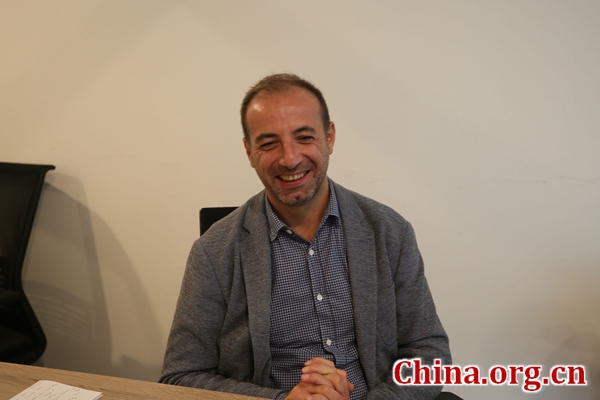Chinese firms aim for shared benefits in Turkey
- By Wang Wei
 0 Comment(s)
0 Comment(s) Print
Print E-mail China.org.cn, September 21, 2018
E-mail China.org.cn, September 21, 2018

For the past 12 years, Alper Taner, consultant to CEO of ZTE Istanbul Telecommunication, has made seven trips to China visiting most of its major developed cities, including Hong Kong, Beijing, Shenzhen, Shanghai and Sanya.
He has been enthralled by the rapid development he witnessed in architecture, science and technology, and the lives of local people.
During his most recent trip last year, he went beyond that to gain an understanding of the progress and changes taking place in Chinese society overall. "China is becoming prosperous and powerful," he exclaimed.
"I hold great respect for the idea of seeking shared benefits proposed in China's Belt and Road Initiative," said Taner.
He believes that the initiative will make great contribution to world development, and this fact will be widely recognized by all in the coming years.
Taner has been working in ZTE Istanbul Telecommunication since 2017, when ZTE, the largest-listed Chinese telecommunications equipment manufacturer, completed its acquisition of a 48.04 percent shareholding in Turkish systems integration provider Netas Telekomunikasyon A.S.
As a witness and participant in the process, Taner said ZTE has never displayed a high profile, but aimed for win-win cooperation based on equality and respect.
"For business people, trust and security are quite important," he said. "The Turkish people always consider the Chinese to be brothers and sisters, and now our countries are strategic partners in the worldwide competition. So, more and more Turkish people believe that Chinese enterprises are trustworthy, and ZTE is just one of them."
Taner said ZTE will get big returns through its investment and cooperation in Turkey, while its locally-based businesses will provide more service support for the country and promote research and development in its telecommunications sector.
According to Jiang Xiangyang, vice president of MKT & Solution Dept. V at ZTE Corporation, countries along the Belt and Road should enjoy shared benefits not only from infrastructure construction, but from overall research achievements.
"ZTE puts 10 percent of its annual revenue into research and development, and the proportion even reached 12 percent last year. Besides, China has a complete industrial chain, making possible the wide application of those research results," he explained.
"Such experience is worthy of being shared across the globe, and the countries along the Belt and Road in particular."
Job opportunities shared
After their entry to the Turkish market, Chinese enterprises have also greatly boosted local employment.
According to Jiang, among the 2,200 employees in ZTE Istanbul Telecommunication, 30 are Chinese and the remaining 2,170 are Turkish. In spite of some cultural shock, they tend to seek common ground while reserving differences, and show respect and understanding for each other. "Cultural and heart-to-heart communication will make more sense than businesses and benefits," he said.
ICBC Turkey, the first Chinese financial institution to operate in the country, also shows its great strength to retain local staff in spite of tough business operations involved in acquiring a majority share in Tekstilbank in May 2015.
"No cuts in branches, no layoffs. Based on this principle, ICBC Turkey has succeeded in overcoming difficulties by operational transformations and with better service quality and greater efficiency," Li Jinhong, deputy general manager of ICBC Turkey, said proudly.
"This move helps win the hearts and minds of local employees, and has since been widely praised by local society," said Li, adding that the bank has done a great work in shouldering its responsibility to ensure employment and social stability in Turkey.






Go to Forum >>0 Comment(s)